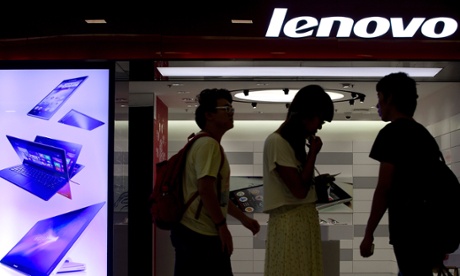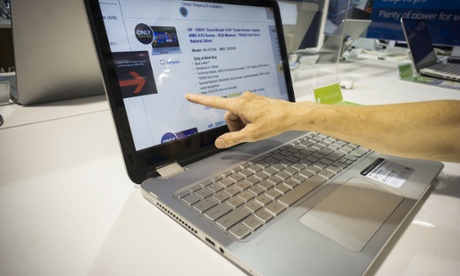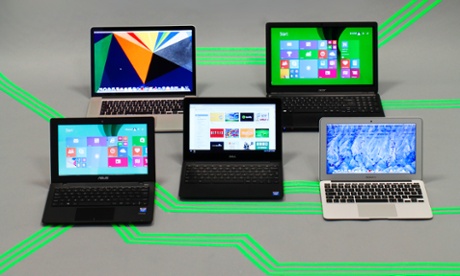The PC market remains in the doldrums worldwide, shrinking by about 1% year-on-year to about 79m units shipped in the three months to the end of September according to new figures from research firms IDC and Gartner.
The data also shows that the biggest six companies are tightening their grip on the market, taking making up a record high of more than 70% of all shipments as smaller players are squeezed out – and more consolidation is expected.
Differences in the data collected by the two research firms also suggests that Taiwan-based Asus is seeing the most success in shipping 2-in-1 devices. Detachable keyboards such as the Lenovo Yoga are classed by Gartner as “ultramobiles” but by IDC as “tablets” – and so not included in its PC shipment figures.
IDC put total shipments at 78.5m units, down 1.7% year-on-year; Gartner at 79.4m, down 0.5%.
IDC’s classification of 2-in-1s as “tablets” means that Asus doesn’t figure in its top five manufacturers by shipment, putting Apple in fifth place for the first time in more than 20 years, with an estimated 4.98m computers shipped.
But Gartner says Asus shipped 5.77m devices in the quarter – which suggests that if it shipped fewer desktops and laptops than Apple’s 4.98m, it must have shipped at least 780,000 2-in-1 devices. “Asus has been concentrating on that segment,” said a Gartner spokesman.
Dave Lindhout has charted the difference between Gartner’s and IDC’s measure of Asus’s “PC” shipments, showing the growing gap between their measures – and so the rising number of 2-in-1 shipments from Asus.
However, the figures are not definitive; variations in how the two companies measure shipments, and differences in how companies report data to them, mean that IDC and Gartner both reckon that Lenovo, the largest PC company, shipped 15.7m PCs - even though Gartner’s figure should include the Yoga while IDC’s excludes them.
The PC market shows little sign of overall recovery. While sales rose year-on-year in developed markets, which were the earliest to adopt PCs, they fell in emerging markets, where PC penetration is lower.
Corporate buyers are still replacing PCs following the end of Windows XP’s support in April, providing an ongoing uplift for sales there: “The continued growth in the EMEA PC market reflects the end of official support for Windows XP and the need to replace older PCs,” said Ranjit Atwal, research director at Gartner.
Mikako Kitagawa, principal analyst at Gartner, said: “Consumers’ attention is slowly going back to PC purchases as tablet adoption peaked with mainstream consumers. The transition from PCs to tablets has faded as tablet penetration has reached the 40-50% range.”
But the ongoing slow sales in emerging markets showed that consumers there who could afford PCs were in effect satisfied – and that those without PCs would choose cheap tablets instead. “This is a one of the major reasons for the slow growth in PC shipments in the emerging market,” said Kitagawa.
For smaller PC players, the major concern is that the shrinking number of PC sales means that larger players are grabbing more share – especially as businesses now purchase the majority of PCs and seek trusted sources. The sum of the top five vendors’ shipments was two-third of the market – and more than 70% including Apple – and all grew more than the industry average.
That will mean further withdrawals from the market, analysts say. This year Sony sold off its PC business to a private equity company, Toshiba announced it will withdraw from selling to consumers, and Samsung pulled out of selling both Windows PCs and Chromebooks in Europe.
Vizio, best known in the TV market, said in July that it was “rethinking” its attempt to break into the PC market; its “computing” page on its website is now dead.
Loren Loverde, of IDC’s worldwide PC tracker group, said that more would follow: “In addition to pressures like slower growth, lower prices and margins, and competition from other devices, the shift to portable PCs and the expansion in emerging markets (not just total PC volume, but more channels, growth in smaller cities and lower income segments) also leaves less room for smaller players.
Loverde added: “There are some other Asian/emerging market players such as Tongfang, Positivo, Haier, LG Electronics, MSI, and Panasonic. Within desktops, vendors outside the top 10 still account for almost 40% of the market – sold through lots of smaller local vendors, value-added resellers, and assemblers. For portables that number is now less than 10%.”
However desktops make up only about 40% of worldwide shipments, meaning that many small players are competing for business – which also drives down margins and sustainability.
Apple’s surprise appearance
Apple’s appearance in IDC’s list of the top five PC makers is not that surprising, said Loren Loverde, of IDC’s worldwide PC trackers division. While IDC and Gartner both name only the top five companies, “the difference between fifth and sixth is not always large– as in this case,” Loverde said.
“PC shipments for the two vendors were also fairly close a year ago – but Apple has been growing faster, so the rank change is not so surprising from a growth perspective.”
Apple also cut prices and benefited from generally higher sales growth in the US, Loverde said. “Asus was harder hit [in PC shipments] by its shift to alternate devices like tablets, including 2-in-1s and smartphones, and has essentially stabilised its PC business over the past year. Our results for the just-past quarter show Asus growing again, but still falling behind Apple.”
Both IDC and Gartner say that Apple was the third-largest PC vendor in the US during the quarter, shipping almost half its worldwide total there and so benefiting from a slight uplift in sales.
Motherboards: no salvation
Sales of motherboards – used either to build PCs or repair existing ones – have not escaped the squeeze on the PC market.
The market is dominated by Asus and Gigabyte of Taiwan, which mainly produce them for companies assembling them commercially, but also sell some to hobbyists and professionals.
According to Sandler Research, the market is roughly steady at about 38m units each quarter, but Asus and Gigabyte are taking a growing share of that as prices are forced down. About 40% of Gigabytes exports go to Asia, particularly China, and 40% to Europe, with the remainder going to the US.
• Breaking HP up isn’t hard to do – but PC and printing arms will be left behind











